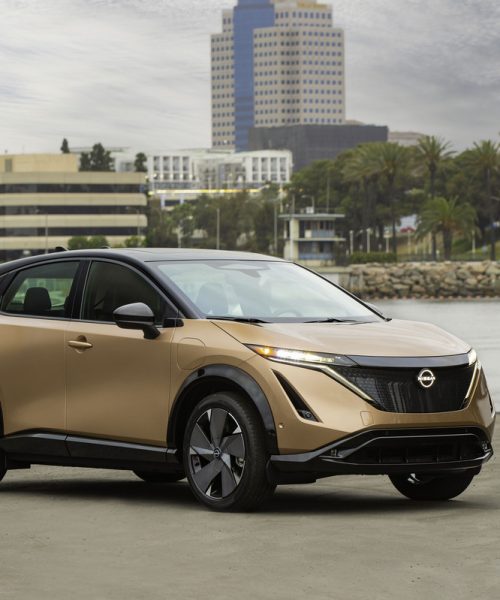“Ooooh, it’s electric,” squealed a passerby on the sidewalk as I whooshed away from the Chedi Andermatt hotel in Switzerland in the stunning $332,200 Jetstream blue Bentley Continental GTC Speed convertible.
The GTC’s fabric convertible top was tucked away despite temperatures in the 50s, with seat heaters and a forced hot air “neck scarf” blowing heat on my neck. As I experienced previously with the plug-in hybrid-electric McLaren Artura, purring through quiet villages in an electric car with the top down is a transformative experience.
Mountain silence and rumbles
Rather than blasting the locals with exhaust noise or remaining haughtily separated by glass and steel, whisking along in silence while looking people in the eye and seeing their smiles makes drives like this vastly better.
Once into the mountains, the GTC Speed’s silence was replaced by a glorious basso rumble of the car’s V8 engine, exhaust sound reflecting off the rock face on the uphill side of the road. It might seem like this could be a jarring change, but the combustion engine’s growl is a soothing low note that suddenly seems to have been there all along, somehow unnoticed. The V8 sounds wonderful, but it is not loud.
The flip-up wind deflector behind the front seats reduces the turbulence that results from air tumbling over the Continental’s windshield and falling into its back seat. This not only minimizes any chill during cool-weather driving, it also contributes to the hushed sound levels in the cabin.
Put the top up and the GTC is quieter still. The hardtop GT is a sarcophagus of silence, buried deep within a tomb. This is partly thanks to the use of laminated acoustic glass, which muffles the passage of sound by nine decibels compared to non-acoustic windows.




But if you want sound, it can be provided by the Naim audio system, which powers 18 speakers with an eye-opening 2,200 watts. Naim, if you’re not familiar, is a legendary stereo manufacturer from Salisbury, England that was founded in 1973. There are active bass transducers built into the front seats to shake the occupants without even making more sound. Bentley offers eight different sound modes to choose from, ensuring the best possible sound to match the occupants’ preferences.
The only fly in the auditory ointment was a persistent squeal from the Continental GT Speed’s powerful carbon-ceramic brakes. This occurred under light pedal pressure and it manifested in all of the cars I drove, so it wasn’t a fluke. This is a common challenge for track-focused carbon ceramic brakes, so it may be that the standard cast iron rotors are a better choice for grand touring in a gorgeous Bentley.
In the hardtop, or with the convertible’s roof closed, the Continental GT also controls the quality of the air in the cabin. It features air ionizers and a new particulate matter filter that both seem newly relevant in the wake of increased wildfires. Neither of these technologies was put to any test in the briskly fresh Alpine air of the test drive.
While it looks like a light refresh on the previous model, Bentley terms the 2025 Continental GT a fourth generation of the car. The attractive styling changes look modest, but throughout the car a total of 64 percent of the content is new.
The “Speed” designation for the sleek Continental GT indicates that this is the twin-turbocharged V8 model, augmented by a plug-in hybrid-electric motor that lets the gorgeous drop-top roll silently around town.
Farewell, W12 engine
As my colleague Kristin Shaw explained previously during her track test of the prototype, the new Continental GT Speed replaces the previous W12 engine with my test car’s hybrid V8 arrangement. While there is charisma in many-cylinder engines, the W12 was derived from the very old Volkswagen VR6 engine’s architecture, and there is good reason why VW retired that engine long ago.
While it makes for an interesting packaging solution to squeeze a narrow-angle 15-degree engine vee into an inline block topped by a single cylinder head that spans the two closely spaced banks, the resultantly compromised air flow through the intake ports makes the engine terribly inefficient.
That’s not only bad for fuel efficiency, it is also bad for power density. Turbocharging minimizes that shortcoming, but the new 591-horsepower V8 is a better design and with the addition of the 188-hp electric motor. The combined 771 hp and 738 lb.-ft. of torque deliver a driving experience that far exceeds anything that was possible with the W12. These numbers represent increases of 19 percent for total system power and 11 percent for torque.
That’s without considering the improved fuel consumption, though people who buy $300,000+ cars can afford the gas. Regardless of the performance, the experience of driving around in the incredible silence of electric power for as far as 50 miles using the 25.9-kilowatt-hour battery pack, provided you don’t stomp on the gas pedal and start the V8, makes the new Speed more enjoyable than the old one.
Driving someplace much flatter and straighter than the roads in the Alps, the car will launch to 60 mph in just 3.1 seconds and it can reach a terminal velocity of 208 mph.
It is challenging to focus on the road with such absurd scenery in Switzerland. Snow streams down from Alpine glaciers like white lava from ice volcanoes. The Bentley’s silence was surely beneficial, leaving mental bandwidth to process the imagery surrounding the car. Hopefully the surprised person on the sidewalk at the hotel appreciated that the Continental didn’t stress her senses with any sound when I departed, leaving her better able to soak up the scenery.






